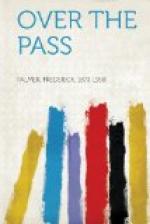“Father, you will keep the bargain I have made,” he said, as if this were a thing admitting of no dispute. “It is fair to the other one, isn’t it? Yes, we have found the truth at last, haven’t we? And the truth makes it all clear for him and for you and for me.”
“You mean—it is all over—you stay out here for good—you—” said John Wingfield, Sr. gropingly.
Then another figure appeared in the doorway and Jack’s eyes returned from the distances to rest on it fondly. In response to an impulse that he could not control, Peter Mortimer was peering timidly into the sick-room.
“Why, Peter!” exclaimed Jack, happily. “Come farther in, so I can see more of you than the tip of your nose.”
After a glance of inquiry at the doctor, which received an affirmative nod, Peter ventured another step.
“So it’s salads and roses, is it, Peter?” Jack continued. “Well, I think you may telegraph any time, now, that the others can come as soon as they are ready and their places are filled.”
Thus John Wingfield, Sr. had his answer; thus the processes of fate that Dr. Bennington had said were in the younger man had worked out their end. Under the spur of a sudden, powerful resolution, the father withdrew. In the living-room he met Jasper Ewold. The two men paused, facing each other. They were alone with the frank, daring features from Velasquez’s brush and with the “I give! I give!” of the Sargent, both reflecting the afterglow of sunset; while the features of the living—John Wingfield, Sr.’s, in stony anger, and Jasper Ewold’s, serene in philosophy—told their story without the touch of a painter’s genius.
“You have stolen my son, Jasper Ewold!” declared John Wingfield, Sr. with the bitterness of one whose personal edict excluded defeat from his lexicon, only to find it writ broad across the page. “I suppose you think you have won, damn you, Jasper Ewold!”
The Doge flushed. He seemed on the point of an outburst. Then he looked significantly from the portrait of the ancestor to the portrait of the mother.
“He was never yours to lose!” was the answer, without passion.
John Wingfield, Sr. recoiled, avoiding a glance at the walls where the pictures hung. The Doge stepped to one side to leave the way clear. John Wingfield, Sr. went out unsteadily, with head bowed. But he had not gone far before his head went up with a jerk and he struck fist into palm decisively. Rigidly, ignoring everyone he passed and looking straight ahead, he walked rapidly toward the station, as if every step meant welcome freedom, from the earth that it touched.
His private car was attached to the evening express, and while it started homeward with the king and the determinedly filial heir-apparent to the citadel of the push-buttons, through all the gardens of Little Rivers ran the joyous news that Jack was “right as rain.” It was a thing to start a continual exchange of visits and to keep the lights burning in the houses unusually late.




